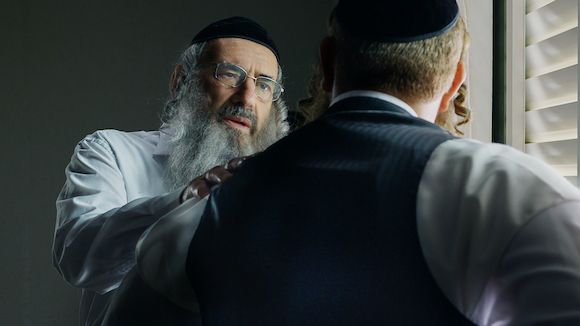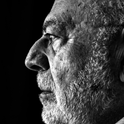The revolution in TV consumption over the last few years has proceeded at such a pace that, by now, settling down for the evening with a box set from Korea, Denmark or Argentina no longer feels remarkable. Despite that, the success of one particular series still seems unlikely. Why is it that Shtisel, an Israeli drama about the domestic travails of a strictly orthodox Jewish family in Jerusalem, is attracting a growing legion of fans?
In some respects, there is something very old fashioned about Shtisel. That isn’t just because it is set within a community where marriages are arranged, gender roles strictly defined and a life of pious study is the highest ideal. Rather, Shtisel is old fashioned in that it recalls Jane Austen, and Victorian dissectors of domestic dynasties.
Throughout its three series the Shtisel family is put under a microscope: their weaknesses and strengths are revealed with wit and pathos. We meet Shulem Shtisel, the family patriarch haunted by the death of his wife, whose mixture of pomposity and bewilderment is alternately loveable and infuriating. He lives, often uncomfortably, with his youngest son Akiva, a talented artist and romantic who struggles to pursue his vocation and his desire for a love match in a community with little space for personal fulfilment. In contrast, Akiva’s sister Giti desperately wishes for conventional respectability. She has to cope with the endless business schemes of her husband Lippe and the inability of her daughter Ruchami and son Yosa’le to follow the straightforward path to an arranged marriage.
Indeed, Shtisel is all about marriage: the quest to find a perfect match, the tension between love and duty, the lifelong struggle of married couples to understand each other. In a strange way it is a very sexy series; the shy smiles exchanged between Yosa’le and his beloved Shira as they court each other during the final series spark a powerful erotic charge.
Where there is sex, there is death. The series begins at the end of the mourning period for Shulem Shtisel’s wife; her ghostly presence is always present in what follows. In the penultimate scene of the third series, a host of dead characters join Shulem and Akiva round the dinner table.
One could read Shtisel as a series whose message is “Look! They are just like us—their lives too are marked by sex and death.” Certainly, the relatability of Shtisel’s characters stands in stark contrast to the ways in which strictly orthodox life is often portrayed. Strictly orthodox—often known as Haredi—Jews are often treated as mysterious, insular and unknowable. In the UK, I have written about how newspaper stories about Jews are often illustrated with photos of faceless black-coated, black-hatted Haredi Jews. They are seen as throwbacks: anthropological curiosities rather than people.
Of course, the Haredi community has its darker side. Its insularity conceals a lack of secular education, ostracisation of those who wish to leave, arranged marriages that are sometimes de facto forced marriages and the concealment of sexual abuse.
In this respect, Shtisel is very different from Unorthodox, which also aired on Netflix and also starred Shira Haas, who plays Ruchami Weiss on Shtisel. Whereas in the European-set series Unorthodox, Haas played a young woman who feels compelled to escape her arranged marriage, in Shtisel she plays a young woman who simultaneously rebels against and affirms Haredi norms: she chooses her own match, yes, but to the intensely religious young scholar, Hanina, whom she adores for his piety. In one scene in the third series, as they work out a way for him to continue to study with a beloved rabbi, they seem to be positively aglow with sacred fervour.
It would be very easy to tell the story of Akiva Shtisel as one of an artist whose genius is unrecognised and has to escape to a secular life in Tel Aviv. Yet he appears never to consider departure; instead, he painfully and semi-successfully works to build a career and to find a woman he can love. And for every Akiva Shtisel in the series there is a Zvi-Arye Shtisel—the older brother who is perfectly happy with a life of religious study and rejects the temptations of a possible singing career.
So what makes Shtisel remarkable is not just that it shows that Haredim are “just like us” but it also shows that in some ways they are not like “us” at all. The key to achieving this nexus of the familiar and the strange is the playfulness that pervades the entirety of the show.
In the third series there is a hilarious sub-plot involving a TV company shooting a series that seems very much like Shtisel itself. Lippe convinces the producer, who has been having problems with the Haredi extras, that he can take over recruiting and managing them himself. Yet he finds it impossible to find anyone willing to take part and ends up rounding up “hipsterim” with long beards and disguising them as Haredim for the shoot.

This allusion to Haredi “cosplay” is also a recognition that this was not a series produced within the Israeli Haredi community itself, although co-writer Yehonatan Indursky has a Haredi background. The show could very easily have fanned the flames of the conflicts between the fast-growing Israeli Haredi population (now over one million strong) and other parts of Israeli society. There is resentment at their exemption from compulsory army service, the subsidies they receive that allow a considerable proportion of Haredi men to spend their lives in full-time study, and the ability of their political parties to extract concessions in governing coalitions. In fact, despite flourishing in Israel, much of the Haredi world rejects Zionism and the idea of a Jewish state before the messianic era.
Yet the less palatable aspects of the Haredi community are de-emphasised in Shtisel, in favour of a focus on its irreducible humanity. The choice of the Geula neighbourhood in Jerusalem as its setting is significant, given that its Haredim have a reputation for being slightly less insular than those in other neighbourhoods. The younger generation of the Shtisel family are primarily Hebrew-speakers, where Yiddish dominates in the more insular Haredi sects. The most sectarian and bigoted character, Shulem’s brother Nuchem Shtisel, who often prefers Yiddish and calls Zionists “those evil people,” is softened by his sheer ridiculousness.
The humanity of Shtisel has ensured that it has received an unofficially warm reception in the Israeli Haredi community itself. While televisions are rare in Haredi homes and Haredi leaders condemn smartphones and the internet, there is a lively online subculture. Hebrew-language Haredi websites have published positive reviews of the series and, while it doesn’t get absolutely everything right, it is usually accurate.
The film and television industry is one of the few sectors of Israeli society with the will and capacity to bridge its deep divisions. While it tends to be conflict-related dramas that receive most success outside of Israel—such as Fauda, which follows an undercover unit in the Palestinian territories—Israeli TV encompasses a wide range of themes. The cast and crew of Shtisel are recruited from a broad spectrum of Israeli society. Strikingly, the script editor in the final series is the Palestinian-Israeli writer Sayed Kashua who received considerable acclaim for the Arabic-language comedy Avoda Aravit (“Arab Labour”). Nuchem Shtisel is played by the Iraqi-Jewish actor Sasson Gabai, known outside of Israel for his role in the film The Band’s Visit, where he played an Egyptian police band conductor. Such ironies are woven into the knowing nature of the series itself, although they are unlikely to be noticed by those not familiar with Israeli culture.
The third series (likely to be the final one) ends with a quietly devastating breaking of the fourth wall by Ruchami Shtisel. Doubtless the ending will be debated by fans long into the future in the same way that the final scene of the Sopranos still continues to reverberate. To me, it encapsulates the great achievement of Shtisel in finding a way to unsettle the viewer’s expectations within a heimishe story of a family we come to love as our own: they are us, yet they are not us; we know them, yet we cannot know them.












